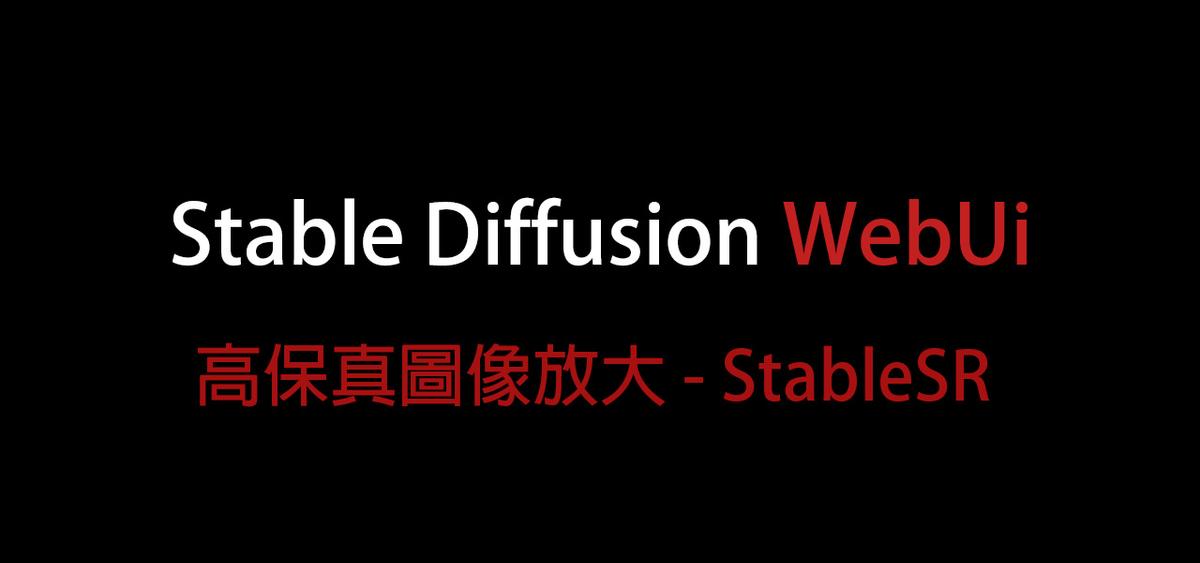High fidelity image enlargement? ? Ultra HD lossless? Full of details? – StableSR….
StableSR plug-in installation & related model download
Step 1: Install StableSR plug-in
For information on plug-in expansion installation, please refer to previous articles: AI Drawing-Stable Diffusion 007- Installation, update, removal and backup of plug-in extensions
Step 2: Download model file
After the installation of StableSR is completed, we need to download the Checkpoints model files & StableSR modules required to operate StableSR and put them into the corresponding folders before we can start using them.
Checkpoints model (Stable Diffusion V2.1 768 EMA checkpoint (~5.21GB)) :
Download from HuggingFace website: HuggingFace
After downloading the file, put it into the folder path: …….modelsStable-diffusionStableSR module (webui_768v_139.ckpt):
Download from HuggingFace website: HuggingFace_StableSR Module
After downloading the file, put it into the folder path: …….extensionssd-webui-stablesrmodels
Step 3: Download other plug-ins or VAE models that are officially recommended for use (optional, not necessary)
StableSR user interface & usage settings precautions
After completing all installations and downloading the required model files, you will see an additional option for StableSR in the Script under the graph function page.
SR Models : Here is the StableSR module downloaded before – webui_768v_139.ckptScale Factor : Picture magnification. (After enabling StableSR, the image size settings in other places will be invalid)Color Fix : When using StableSR and divided drawing (ex. Tiled Diffusion), it is easy to cause color shift, so Color Fix needs to be turned on. There are a total of 2 options (Wavelet, AdaIN). The official website here recommends using the Wavelet algorithm for better results.Pure Noise : When Pure Noise is turned on, SD will ignore the redraw range and ultimately generate a more detailed picture. When Pure Noise is not turned on, even if the redraw amplitude is set to the maximum value of 1, the final image will not fully reach the original detail presentation of the redraw amplitude of 1 (this may be more ideal for the imaging effect in terms of aesthetics), and in When Pure Noise is not turned on, the official recommendation is to set the redraw amplitude to 1.
Operational notes/recommendations:
Note that Checkpoint needs to select the specified large model, and although SD VAE does not necessarily need to be provided by the official website, since the official website provides another one, choose the one recommended by the official website.
It is recommended to use the sampling method (Sampling method) of the graph: Euler a, CFG Scale=7, Sampling steps (Sampling steps) >= 20. The actual measurement recommendations of the official website, plus Negative prompts will help improve the imaging quality (ex. 3d, cartoon , anime, sketches, (worst quality:2), (low quality:2)), and positive prompts (Prompts) are not very helpful, but they may have some effect (ex. (masterpiece:2), (best quality) :2), (realistic:2), (very clear:2)) When the generated image size is > 512, it is recommended to use Tiled Diffusion & VAE, otherwise the imaging quality will deteriorate. (It will really get worse…Tiled Diffusion & VAE are basically a must-use combination, right?)
(For information on how to install and use Tiled Diffusion & VAE, please refer to previous articles: AI繪圖-Stable Diffusion 016- Tiled Diffusion with Tiled VAE)
When used with StableSR, the official recommendations for Tiled Diffusion settings are as follows:
Method = Mixture of Diffusers :
Latent tile size = 96, Latent tile overlap = 48
Latent tile batch size : The bigger the better, as long as it doesn’t blow up the video memory.
Select “none” for Upscaler (Because there is no need to zoom in here, the zooming operation will be performed at StableSR)
After all settings are completed, put the image into the graph drawing window and start calculating the graph~
StableSR image enlargement actual measurement
Damn it, I have set it up exactly according to the parameters on the official website, and the tutorials I found online also have the same settings. The only difference is that I use real-life photos, rather than two-dimensional or 2.5D animated photos. But what about the “high-fidelity” amplification that was promised? , Ultra high definition lossless? Full of details?
This plug-in also says Suitable for most images (Realistic or Anime, Photography or….)
Alas~ Forget it, I have already spent time installing/downloading some model files to be matched. Let’s record the results and uninstall and delete them later. Don’t waste space and increase the burden of SD operation.
512×768 4x magnification:
I only zoomed in 4 times. I thought 2 times would be enough. I zoomed in a little bit at a time, but the result was not much different, except that the realistic photo became very flat, and then the picture was full of grainy textures/artifacts/bad paintings. Various small blocks…..
PS. 512×768 magnification 4 times, if not paired with Tiled Diffusion with tiled VAE, it will look like this:
Finally, I am really curious whether the effect will be different if I follow the two-dimensional/2.5D animation pictures everyone uses for teaching:
When I tried using two-dimensional pictures, the effect was not as bad as the real-life photos, but it was not as stunning as it was. StableSR required more downloaded files and settings, but the effect was not better…
(For comparison, the original image 768×768 is enlarged 4 times (3072×3072). The detail effect will be better if the Pure Noise effect is enabled than if the Denoising setting 1 is not enabled)
Well, the StableSR plug-in uses all the parameter settings recommended by the official website and has a lot of problems. I am too lazy to spend more time doing more parameter adjustment tests. If anyone tries it out and gets better results in the future, if possible, please kindly tell me what the problem is~~~
